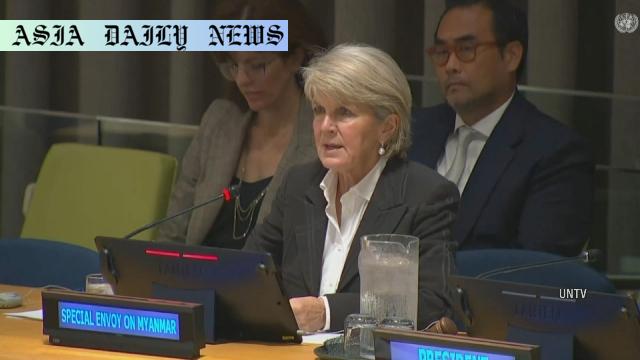Myanmar: Amid post-earthquake recovery challenges, violence surges across the country, deepening the ongoing humanitarian crisis.
- UN envoy Julie Bishop expresses concern over Myanmar’s rising violence and post-quake tensions.
- Temporary ceasefire breaks down, intensifying humanitarian challenges.
- Rohingya minority faces harsh realities including forced recruitment and abuse.

Introduction: Myanmar’s Unfolding Tragedy
Myanmar finds itself at a critical juncture, where escalating violence and natural disasters are compounding an already fragile situation. Julie Bishop, the UN Special Envoy, has drawn global attention to the turmoil gripping this Southeast Asian nation during her address to the UN General Assembly. Since the military coup of 2021, Myanmar has faced an unrelenting socio-political crisis, one that has deeply affected its citizens and displaced millions. A recent devastating earthquake in March has further exacerbated problems, straining already limited resources and social cohesion. This combination of political unrest and natural disaster presents a stern test for the international community’s ability to respond.
Natural Disaster Amid Political Instability
The earthquake that struck central Myanmar in March claimed more than 3,700 lives and left over 5,000 injured, according to the military junta’s estimates. Despite these staggering numbers, post-earthquake relief efforts have been hindered by the ongoing conflict between pro-democracy factions and the ruling military government. The temporary ceasefire declared to facilitate humanitarian assistance was short-lived, with sporadic violence complicating rescue operations. Commenting on the situation, Bishop noted that the lack of commitment to peace was pushing Myanmar towards self-destruction. These developments highlight the inability of the military junta to prioritize the welfare of citizens over its quest to maintain power.
The Crisis Within a Crisis: The Plight of the Rohingya
Compounding the broader instability is the plight of the Rohingya, a Muslim minority population predominantly based in Myanmar’s Rakhine state. The community has long endured systemic persecution, including forced displacement and denial of basic human rights. Bishop emphasized that many Rohingya continue to face forced recruitment by armed groups, a harrowing reality that underscores the lack of security and justice in the country. With international support for the Rohingya remaining limited, the community’s situation symbolizes the deeper challenges of addressing Myanmar’s humanitarian crisis.
International Response: A Need for Unified Action
To address Myanmar’s escalating crisis, the international community must come together with a coherent strategy that combines immediate relief efforts with long-term solutions. Financial aid alone will not resolve the deeply entrenched political and social issues. Bishop’s call for urgent action must resonate with nations across the globe, emphasizing the role of diplomacy, sanctions, and humanitarian intervention. However, the fractured geopolitical landscape and differing international priorities pose significant challenges to forming a united response. Without decisive and collective action, Myanmar is at risk of becoming a prolonged humanitarian and political disaster.
A Path Forward for Myanmar
The path to reconciliation and recovery in Myanmar is fraught with challenges, but it is not an impossible goal. Ensuring accountability for human rights abuses, fostering inclusive governance, and rebuilding trust among conflicting factions are critical. Additionally, targeted international interventions, whether through the UN or regional bodies like ASEAN, can provide a framework for constructive dialogue and sustainable development. Bishop’s observations reflect an urgent need for Myanmar to pivot away from its current trajectory toward self-destruction and embrace a future defined by peace and resilience. The window for change is narrow, but with concerted effort, it can be achieved.



Commentary
The Collapse of Ceasefires: An Intractable Challenge
It is disheartening to witness the failure of ceasefires, even in the wake of a devastating natural disaster like the March earthquake. These moments should ideally serve as a rallying point for unity and humanity, but in Myanmar, they have only highlighted the entrenched divisions. Both the military junta and pro-democracy groups carry a part of the blame for failing to adhere to a humanitarian ceasefire. This lack of cooperation diminishes hope for peaceful resolution, leaving civilians to shoulder the heaviest burdens of conflict.
Rohingya Crisis: A Telling Symptom of Myanmar’s Divisions
The plight of the Rohingya is one of the most heart-wrenching aspects of Myanmar’s protracted crisis. Decades of systemic discrimination have left this community marginalized and vulnerable to exploitation. Forced recruitment and other abuses underline the complete absence of protection for minority groups under the current regime. International aid directed toward the Rohingya has been insufficient, often hampered by restrictions placed by the military government. It is crucial for global players to focus their attention on this humanitarian catastrophe as a key element of resolving Myanmar’s broader issues.
The Role of the International Community
Myanmar’s situation demands more than mere expressions of concern from the international community. Financial aid and sanctions must be accompanied by robust diplomatic efforts that prioritize the welfare of ordinary citizens over geopolitical interests. Countries in the region, particularly those within ASEAN, have a unique role to play in applying pressure on Myanmar’s military leadership, as their proximity makes them more attuned to the crisis’s spillover effects. The need for a concerted and unified global response has never been more urgent.
Hope Amid Crisis
Despite the grim realities, Myanmar is not without hope. The resilience of its people and the global awareness of its plight can serve as catalysts for change. However, immediate action is needed to prevent further loss of life and societal collapse. The bravery and determination of Myanmar’s citizens, particularly those fighting for democracy, are a testament to the human spirit’s enduring strength. By highlighting these stories and amplifying calls for justice, we can contribute to a brighter future for the nation.